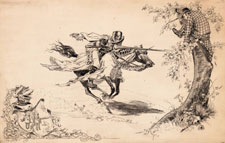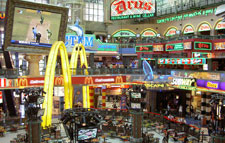Welcome to my blog. Anyone who knows me knows that I like food. Food, in one form or another, has been at the center of my professional career for over forty years. And even growing up with my mother's home cooking, I liked food. Why is food such a passion of mine? There are many reasons, and I'll offer short explanations here:
Food is Ubiquitous: We encounter food every day of our lives. It's everywhere. Try to think of anything else in the world that we experience as much as food.
Foods Engages All Five Senses: The senses of Taste, Smell, and Feel (Texture) are pretty obvious. But even Sight ("We eat with our Eyes") and Sound (Tape a family meal sometime, and the sounds of utensils hitting plates will almost drown out the conversation.).
Food is Social: Sure fast food has turned a lot of eating occasions into solo events, but most of our food experiences are with other people, especially family members. Food provides the setting for social interaction.
Food is About Places: Whether food is eaten around a campfire, at the family dinner table, or alone in a car, it is a physical event anchored in a physical place. You may order food online, but you don't eat "bytes." Some foods, like wine, evoke a special place, but that's another story (see Terroir).
Food Promotes Conversation: Conversation is the natural outcome of a social setting. Otherwise, why is a first date or an important business meeting invariably organized around a restaurant meal? And these conversations are often the basis for storytelling and even memory.
Food is Taste: Of course. But even Taste is a complex and sometimes unpredictable experience. Taste can be as much about Discovery as it is about Familiarity.
Food Has Sources: Where food came from was easier to understand and appreciate before the rise of global food processing enterprises. I favor the word the French use to explain wine, "Terroir: The Taste of the Earth."
Food Creates Language: Think of the aforementioned word, "Terroir," and the expansive lexicon surrounding wine. Indeed, the very complexity of food encourages a precision in describing it.
Food is Cultural: Worldwide food distribution systems have provided us with more experiences with food from other cultures, and a greater appreciation for those cultures.
Food Provides Sustenance: In developed nations, one could easily argue that food is much more than sustenance, so I prefer to focus on the nutritional benefits (or harm) of different foods. A better understanding of different foods can enhance their benefits, especially for children.
Food is Economics: When I was in high school, we had a course called "home economics," and most of the subject matter was food. Further proof exists in the percentage of the average family's income that is spent on food.
Food is Produced with Skill: Whether it is on a farm or in the orchard, there is extensive skill and experience involved in growing or raising our food. Modern processing has added technology and required more knowledge in the enterprise. In restaurant settings, the most important person to your enjoyment of food is often a grill cook, a sommelier, or a sous-chef.
I've titled my blog, "A Connecticut Yankee in King Arthur's Food Court." This twist on Mark Twain's 1889 classic tale seemed apt for this Yankee who grew up in New England but has spent most of his adult life in places outside of New England, from New York City to Kentucky, to Chicago, to Dallas, to Miami, to Ann Arbor, to New Orleans, and to Atlanta. I never had to deal with the Knights of the Roundtable, but there were many skirmishes that resembled Hank Morgan's escapades where guile saved the day!
I will be posting blogs as inspiration strikes. If you like what you read, you can sign up to follow me. In upcoming posts, I'll elaborate on the themes described above and try to bring them to life with real-life experiences and stories. I welcome your comments. In social media, you can follow these themes: #OdysseyCMO, #DriveSameStoreSales, #FindaWay, #PositiveComps.



